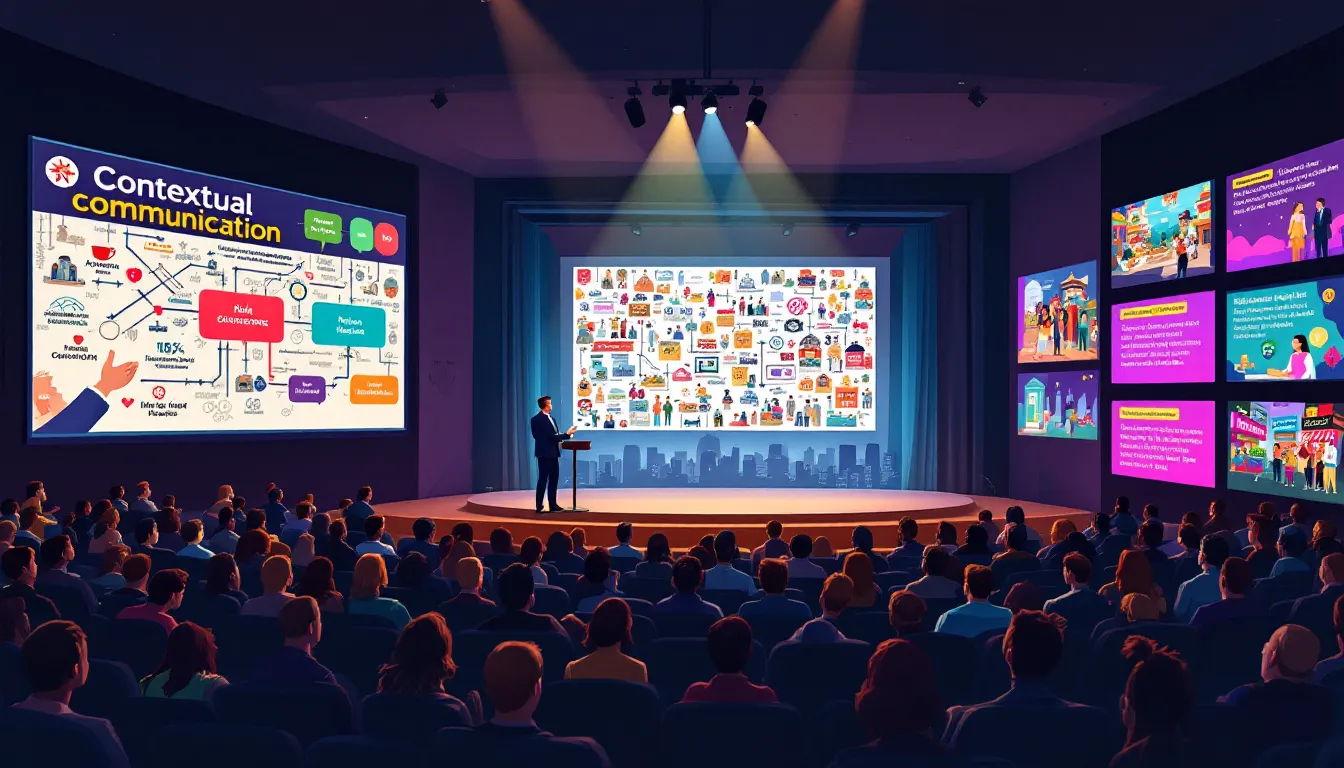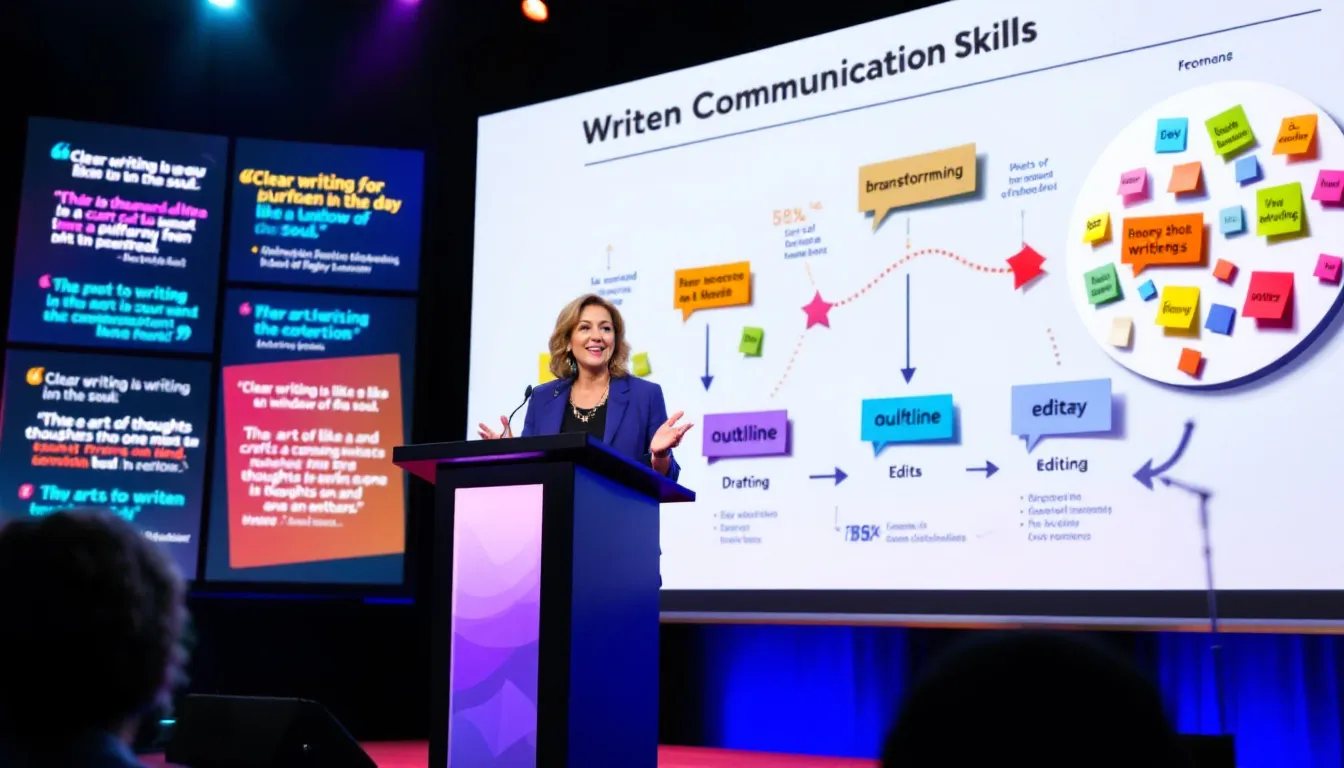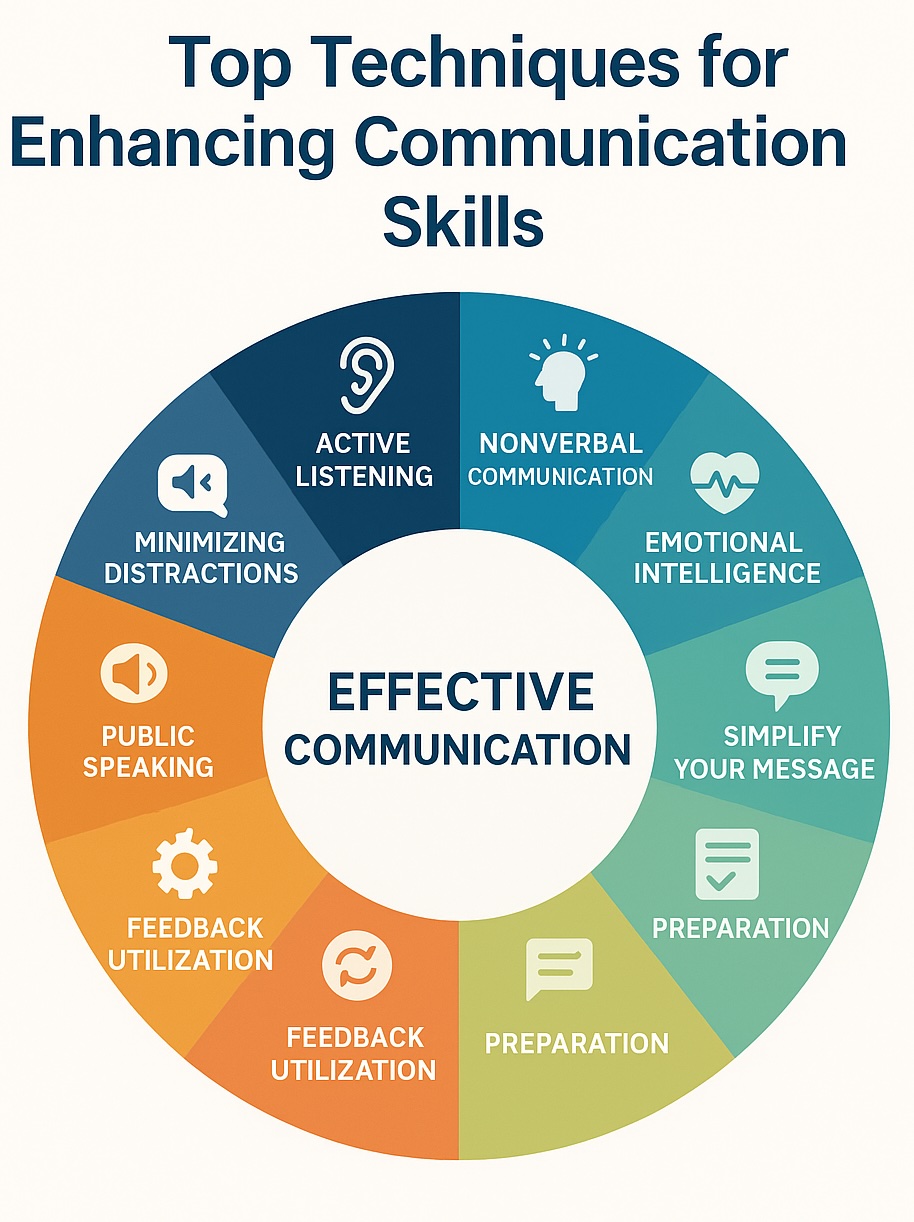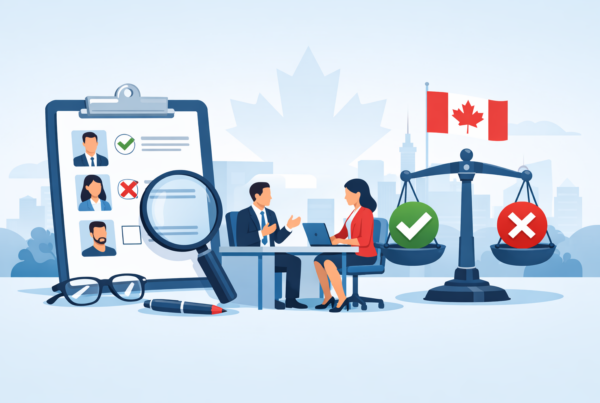Top 12 Techniques for Enhancing Communication Skills
Looking to enhance your communication skills? Our guide will teach you how to communicate, listen actively, and connect better with others, all while enhancing communication skills. Effective communication is essential for improving daily interactions, resolving conflicts, and fostering trust. By applying these techniques, you can navigate conversations confidently and effectively.
Understanding different cultures is also crucial for effective communication. Acknowledging cultural differences in communication styles, such as body language and verbal expressions, can help avoid misunderstandings and foster collaboration.
👉 Ready to unlock your full communication potential? Book a free 15-minute strategy call with me today and start transforming your conversations!Book Now
Key Takeaways
- Active listening and nonverbal communication are key foundations for effective communication. They help you understand the speaker’s message and intent.
- Emotional intelligence and adaptability in communication styles enhance relationships and ensure your message resonates with different audiences.
- Preparation, simplification of your message, and engaging storytelling can significantly improve communication clarity and audience engagement. Ensuring clarity and effectively handling complex information by breaking it down into simpler parts are essential strategies to avoid misunderstandings and make intricate details more accessible.
Introduction to Communication
Effective communication skills are the foundation of personal and professional success. They enable individuals to convey their message effectively and build strong relationships. Communicating effectively involves verbal and nonverbal communication, including body language, written communication, and active listening.
Developing effective communication skills is crucial for career success. It helps individuals express their ideas, negotiate, and build trust with others. Good communication skills are essential for teamwork, collaboration, and problem-solving, as they facilitate sharing ideas and ensure that all team members are on the same page.
Effective communication is vital for building trust, resolving conflicts, and achieving common goals in a professional setting. Nonverbal communication, such as facial expressions, eye contact, and body language, plays a significant role in conveying emotions and attitudes. Verbal communication, including tone of voice and language, is also essential for effective communication, as it helps to convey the message clearly and avoid misunderstandings.
Active listening is a critical component of effective communication. It involves paying attention to the other person, understanding their perspective, and responding thoughtfully. Emotional intelligence is also essential for effective communication, as it helps individuals understand and manage their emotions and empathize with ot
By developing effective communication skills, individuals can improve their personal and professional relationships, achieve their goals, and enhance their overall well-being. Good communication is the key to building trust, avoiding misunderstandings, and ensuring that everyone is on the same page.
Master the Art of Active Listening

Picture this: you’re in a conversation, nodding, but your mind is elsewhere. Sound familiar? Practicing active listening is about being fully present and engaged with the speaker, ensuring you understand their words and their intent. This technique is foundational for effective communication skills.
Active listening involves summarizing the conversation’s main points without injecting your opinions. This clarifies the message and demonstrates attentiveness. Allow the speaker to express their thoughts fully without interruptions, fostering mutual respect, open communication, and listening skills, which play a vital role in effective communication as an active listener. Follow-up is also crucial to ensure that any questions or clarifications are addressed, maintaining accountability and understanding.
Ask open-ended questions to encourage the speaker to elaborate on their thoughts. This fosters dynamic conversation and shows genuine interest in their perspective. Avoid multitasking or planning your response while the other person is speaking. Instead, focus on their words and body language to fully grasp the message.
Paraphrasing the speaker’s words in your own words enhances clarity and shows active listening in the same way. These techniques build stronger connections and improve communication skills, including expressing ideas and careful word choice.
👉 Want personal guidance on mastering active listening and becoming a communication pro? Let’s talk—schedule your free 15-minute coaching call here!Book Now
Leverage Nonverbal Communication

Did you know that nonverbal cues account for roughly 65% of communication? That means understanding body language, facial expressions, and eye contact is crucial for interpreting messages accurately. Nonverbal communication can often convey more than words alone.
Body language plays a significant role in how your message is received. Positive body language, such as maintaining eye contact and using open gestures, reinforces your verbal communication. Eye contact helps you gauge if your message is being received. It also demonstrates confidence and attentiveness. Holding your gaze in four—to five-second intervals during conversations can keep the other party engaged, as both voice and body language contribute to effective communication.
Facial expressions also convey a wealth of information. A simple smile can indicate friendliness, while compressed lips might signal discomfort or disagreement. Attention to these nonverbal cues and signs can help you adjust your communication strategy to ensure your message communicates as intended. Being attuned to nonverbal signs, such as gestures, facial expressions, and body language, is essential for understanding underlying sentiments and social dynamics. Leveraging nonverbal communication enhances message effectiveness and minimizes misunderstandings.
👉 Nonverbal skills can make or break your message. Get tailored coaching to master them—book your free 15-minute call now!Book Now
Develop Emotional Intelligence
Imagine navigating any conversation with empathy and self-awareness. That’s the power of emotional intelligence (EQ). EQ is recognizing, understanding, and managing emotions in yourself and others. It is a cornerstone of effective communication skills.
Emotional intelligence comprises two essential parts: self-awareness and empathy. Regularly checking in with yourself can enhance self-awareness. It allows you to understand your emotional state better, which allows you to communicate more authentically and manage your reactions during conversations. On the other hand, empathy involves seeing situations from others’ perspectives and being mindful of their feelings. This enhances conflict management and relationship building.
Incorporating emotional intelligence into your communication strategies fosters trust and openness. You can provide effective feedback on strengths and weaknesses by listening attentively and responding respectfully. Developing EQ improves your communication skills and strengthens your personal and professional relationships.
👉 Emotional intelligence is a game-changer. If you’re ready to elevate your communication impact, book your free 15-minute strategy call today! Book Now
Simplify Your Message
In a world bombarded with information, simplicity is key. Effective communication is centred on clarity and brevity, ensuring your messages are easily understood. Start with the most important information to capture your audience’s attention immediately.
Using simple language and avoiding jargon makes your message effectively accessible to everyone. Structure your emails and written communication with the most significant points in the first paragraph. Bullet points can also help emphasize key ideas and organize information clearly. Simplifying your message ensures clarity and prevents misunderstandings.
👉 clarity and confidence go hand in hand. Let’s refine your communication approach together—schedule your free 15-minute call now. Book Now
Engage with Storytelling

Who doesn’t love a good story? Storytelling is a powerful tool that can significantly enhance your communication skills. Humans have an inherent tendency to engage with stories, making them a compelling way to share ideas.
Storytelling connects emotionally with the audience, making your message more impactful and memorable. It can simplify complex ideas, making them easier to grasp. Storytelling can simplify complex information, making it more accessible to your audience. Context in storytelling enhances relatability, fostering a deeper emotional connection with your audience. Whether sharing a personal anecdote or illustrating a concept with a scenario, storytelling keeps your audience engaged and invested in your message.
Injecting humour or personal experiences into your stories can also help maintain interest and build trust. Engaging with storytelling helps communicate effectively and leaves a lasting impression.
Prepare Ahead for Conversations
Preparation is half the battle won. Knowing what to say and organizing your thoughts beforehand can significantly enhance your communication skills. Effective preparation also involves researching supporting information and anticipating potential questions or disagreements, which is a key aspect of problem-solving.
Preparation is crucial for effective communication within the entire organization. It ensures that all team members are aligned and can collaborate efficiently towards shared objectives.
Organize your speech material clearly and outline your key points to ensure a structured delivery. Preparing specific examples illustrating your points can strengthen your communication, especially in negotiations and performance reviews. Preparation enables confident communication and helps avoid misunderstandings and develop strategies.
Utilize Feedback for Improvement
Feedback is a gift that keeps on giving. It is essential for improving communication skills and helping you identify specific areas for improvement. Encourage colleagues to provide constructive criticism on what worked well and what could improve your workplace communication efforts.
Gaining buy-in from your team is crucial when implementing feedback, as it fosters a positive organizational culture and effective communication.
Anonymous surveys and 360-degree feedback are effective methods for gathering candid feedback insights. Incorporating feedback helps refine your approach and enhances communication effectiveness.
Adapt Your Communication Style

One size does not fit all when it comes to communication. Understanding your audience is essential for tailoring your communication style to suit their needs and context, as not everyone responds the same way. Different communication channels require distinct tones and styles for effective engagement. Adapting your communication style is especially important in virtual settings, where non-verbal cues and technology tools play a crucial role in maintaining clarity and connection.
The appropriate tone varies with context and audience, impacting message effectiveness. Emotional intelligence helps you react to feedback and refine your approach. Adapting your communication style ensures effective interaction with diverse audiences and prevents misunderstandings. Understanding the audience’s background is particularly significant during group discussions, as it helps in overcoming potential barriers and interpreting communication cues accurately.
Overcoming Barriers
Poor communication can lead to misunderstandings, conflicts,developinghips. Identifying and overcoming barrier essentials to effective communication is essential for fostering better interacconvey their messagent barriers is poor listening skills, which can lead to misinterpretation and misunderstandings.
Nonverbal communication, such as body language and facial expressions, can also pose challenges. Negative nonverbal cues can convey unintended emotions and attitudes. Language barriers, cultural differences, and technological issues further complicate communication, making it essential to develop strategies to overcome these challenges.
Effective communicators use various communication tools, such as video conferencing and written messages, to ensure their messa conveyed clearly. Practicing active listening, asking questions, and seeking feedback can help overcome barriers and ensure the message is understood.
Developing emotional intelligence and empathy is crucial for overcoming communication barriers. It helps individuals understand and manage their emotions and respond to others constructively. By being aware of these barriers and developing strategies to overcome them, individuals can improve their communication skills and achieve their personal and professional goals.
Effective communication is a two-way process that requires effort and commitment from all parties involved. Establishing a positive and respectful communication environment is essential. By overcoming barriers to effective communication, individuals can build trust, resolve conflicts, and achieve their goals, leading to greater success and fulfillment in their personal and professional lives.
Practice Public Speaking
Public speaking is an excellent way to enhance your communication skills. It improves the organization of thoughts, clarity in speaking, and audience engagement. Increased practice in public speaking leads to greater confidence.
Effectively conveying complex information is crucial in public speaking, as it ensures your audience can easily understand intricate details.
You can begin your practice with friends or colleagues. Alternatively, try practicing in front of a mirror. Focus on maintaining eye contact, using positive body language, and keeping a steady speaking pace. Practicing public speaking enhances your ability to communicate in any professional setting and supports your career development.
👉 Whether speaking to one person or a room full of people, I can help you confidently communicate. Book your free 15-minute consultation today!Book Now
Manage Your Emotions
Emotions can be a double-edged sword in communication. Managing stress effectively is a key component of high emotional intelligence, which enhances communication. Psychological safety is essential for managing emotions during communication, as it fosters a positive work environment where employees feel secure in sharing their thoughts and feedback.
Here are some techniques to help handle stress and improve your communication skills while effective communicators are communicating effectively:
- Deep breathing
- Taking short breaks
- Practicing mindfulness
- Engaging in physical activity
- Seeking support from others
Incorporating these techniques can enhance your emotional intelligence and improve your communication skills.
Mindfulness enhances composure by allowing one to focus on the present moment without judgment. Keeping emotions in check ensures effective communication and maintains professional relationships.
Minimize Distractions
Distractions can derail a conversation faster than you can say “stay focused.” Minimizing distractions is crucial for effective communication, especially during difficult conversations. Closing doors, choosing quieter locations, and clearing clutter can significantly reduce visual and auditory interruptions.
In virtual settings, it is particularly important to minimize distractions to maintain engagement and clarity. Reducing background noise, such as turning off music and the TV, can greatly improve communication. Adjusting lighting to enhance visibility for facial expressions and visual aids can also aid communication tools. Minimizing distractions helps maintain focus and ensures clarity in conversations while communicating through video conferencing and communications.
Communicating Effectively in Teams
Effective communication is critical for teamwork and collaboration. It enables team members to share ideas, coordinate efforts, and achieve common goals. In a team setting, effective communication involves active listening, clear and concise language, and nonverbal cues, such as body language and facial expressions.
Team members should maintain eye contact, use positive body language, and avoid distractions to ensure they are fully present and engaged. Effective team communicators use “I” statements, ask open-ended questions, and seek feedback to ensure everyone is on the same page and the message is understood.
Nonverbal communication, such as tone of voice and language, is also essential for effective team communication. It helps convey emotions and attitudes. Team leaders should establish a positive and respectful environment, encourage open communication, and provide constructive feedback to ensure team members feel valued and supported.
Effective team communication involves sharing ideas, coordinating efforts, and building trust. Establishing a culture of open communication and mutual respect is essential. By communicating effectively in teams, individuals can build strong relationships, achieve their goals, and enhance their overall well-being.
Effective communication in teams requires effort and commitment from all team members. Establishing a communication strategy that works for everyone is essential. By developing effective communication skills and strategies, teams can overcome barriers, achieve their goals, and succeed in their endeavours.
Following these techniques and continuously practicing can enhance your communication skills and become an effective communicator in any setting.
Strengthen Written Communication Skills

Clear and professional written communication is essential for personal, professional, and career success. Good communication is crucial for correcting any grammatical or spelling errors before sharing written messages. Using clear, concise language ensures that your message is easily understood.
Written communication also plays a vital role in personal relationships by helping to express ideas clearly, resolve conflicts, and build trust.
Visual aids can enhance comprehension by breaking down lengthy text and illustrating concepts effectively. Improving written communication skills enhances overall communication abilities.
Summary
In summary, mastering communication skills involves a combination of active listening, leveraging nonverbal cues, developing emotional intelligence, and simplifying your message. Engaging with storytelling, preparing ahead for conversations, and utilizing feedback can further enhance your communication abilities. Additionally, integrating non-verbal communication, such as body language, tone of voice, and facial expressions, with verbal messages is crucial for clarity and connection.
You can become an effective communicator in any setting by adapting your communication style, practicing public speaking, managing your emotions, minimizing distractions, and strengthening your written communication skills. Remember, the key to better communication lies in continuous practice and improvement. Each team member plays a vital role in this process by understanding their responsibilities and contributing to the team’s goals.
👉 You’ve got the tools—now let’s put them into action! Book your free 15-minute coaching call and take your communication skills to the next level.Book Now
Frequently Asked Questions
What is active listening, and why is it important?
Active listening means genuinely focusing on the speaker and responding thoughtfully. It helps deepen understanding and fosters trust, which is essential for strong communication and building meaningful relationships.
How can storytelling enhance communication?
Storytelling enhances communication by connecting emotionally with your audience, making your messages more impactful and memorable. It also simplifies complex ideas and keeps listeners engaged.
What role does emotional intelligence play in communication?
Emotional intelligence is crucial in communication. It helps you understand and manage your emotions and those of others, leading to better empathy and more effective interactions. Improving your emotional awareness will enhance your ability to connect and communicate with others effectively.
Why is it important to adapt your communication style?
Adapting your communication style is crucial because it helps ensure your message resonates with your audience and reduces the chance of misunderstandings. Adjusting how you convey information can lead to more effective and meaningful interactions.
How can I improve my written communication skills?
To boost your written communication skills, focus on proofreading your work, using clear and concise language, and adding visuals to make your message easier to understand. You’ll see improvement in no time!
👉 Stop waiting to improve your communication. The best time to start is now! Please book your free 15-minute coaching call with me and let’s get started. Book Now



